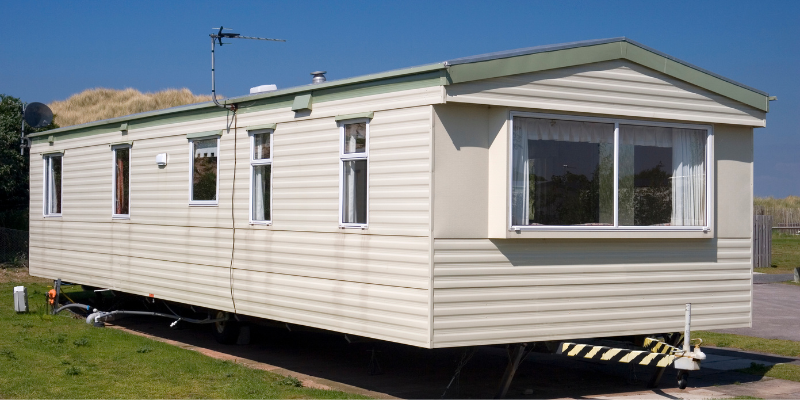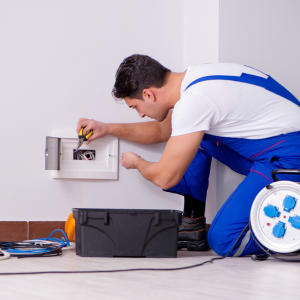
In some cases, it may be perceived as overwhelming to sell a mobile home in Texas that has issues identified in a Texas mobile home inspection report; however, there are ways to mitigate these issues, making them less insurmountable as a challenge. Learning some Texas real estate laws, including the specific details regarding Texas mobile homes, will enable you to optimize the strategies needed to sell the mobile home effectively. This guide will help you to sell the mobile home by utilizing expert mobile home selling strategies and overcoming obstacles to achieve a successful closing. You will be able to work on overcoming the issues related to repairs, marketing, and negotiations with prospective buyers, and this will provide you with valuable material to support a mobile home selling process that is practically effortless.
Key Highlights
- Understanding Texas real estate laws and strategies is key to selling homes with failed inspections.
- Successful repair and negotiation tactics can transform inspection challenges into selling opportunities.
- Foundation and structural issues are common inspection fail points needing proactive attention.
- Transparent disclosure of property issues builds trust and eases the buyer negotiation process.
- Strategic pricing adjustments and targeting cash buyers can enhance sales prospects in a competitive market.
Understanding the House Inspection Process
When danger stemming from adverse mobile home inspections is involved, selling mobile homes in Texas is a precarious endeavor. Understanding the Texas house inspection process in detail is critical for proactive sellers. The home inspection process is a multifaceted evaluation of the residence in question. Specifically, the home is assessed for its foundation, roofing, plumbing, electrical, overall structure, and many other vital features. Knowing the inspection process and what the inspectors will focus on will assist the sellers in scanning the home for potential issues and rectifying them before they risk crippling a possible sale. Providing buyers with a home that is “move-in ready” ensures they do not lose interest in the house.
It is equally essential to know the common causes of failed inspections as it is to see the process of selling them mobile homes. Foundational issues, compromised roofs, water leaks, and obsolete electrical wiring are a few issues that inspectors flag, which can lead to mobile home inspection failures. Prioritizing inspections helps mitigate delays and increase selling prices. Correcting issues that potential buyers will flag before they can view the home will also lead to increased marketability and profitable, quick sales. Unquestionably, the knowledge, proper preparation, and correct selling actions transform the challenges that failed inspection creates into unique selling points that potential buyers will recognize as they view the mobile home in question.
Mobile Home Cash Offer helps Texas mobile home sellers overcome inspection challenges with cash solutions. We spot issues early and guide repairs—or buy homes as-is—making sales faster, simpler, and stress-free.
Key Factors in a House Inspection
For prospective buyers and sellers alike, understanding where inspectors devote their attention during an inspection is essential. They then thoroughly analyze their report to determine a property’s condition, examining its fundamental aspects closely, including the structural foundation, electrical systems, plumbing, roof, and potential pest issues. One of the things that we focus on is the foundation. If we see any damage, the expected repairs will be extensive, and more structural issues will arise, often resulting in an automatic fail on the inspection.
Also taken into consideration are the ages and qualities of the major systems, such as the HVAC and water heater. Discovering this information is beneficial for both sellers, who can identify necessary repairs before listing the home, and for buyers, who can make an informed decision. Additionally, the inspection reports almost always detail the safety issues present, such as outdated wiring. In some cases, this may be the only reason the buyers and sellers reach a deal.
Roof condition is another key focus. Signs of leaks, shingle damage, or improper installation can raise red flags—especially in Texas, where climate-related wear and tear is common. Regular roof maintenance can help prevent issues that negatively impact inspections. Understanding these factors enables sellers to anticipate and address problems early, resulting in a smoother real estate transaction.
Reasons for a Failed Inspection

There are several potential vulnerabilities associated with a home inspection failing, and clarifying these issues is valuable to home sellers. Problems of a structural nature are most prevalent, particularly in relation to the foundation, including topics such as settling, cracks, and moisture intrusion. Inspectors also evaluate the roof and walls, as well as damage to or failing maintenance of support beams. These areas can quickly become the weak link in negotiations.
Electrical and plumbing systems are frequent trouble spots. Outdated wiring, faulty panels, leaks, and aging pipes—particularly those made of galvanized steel—often raise concerns about safety and cost for buyers. Addressing these issues early can prevent major setbacks.
Aspects of the environment and pest inspection, such as detecting termites, vermin, mold, or lead paint in older homes, can also disrupt an inspection. In Texas, the state’s climate can exacerbate these issues. Pest control and environmental testing reduce the risk of such surprise problems. By being analytical and addressing these prevalent issues, sellers can set realistic expectations and increase the likelihood of the closing proceeding smoothly.
After understanding potential pitfalls, sellers can take proactive measures to ensure a smoother home inspection process. Here are some practical tips to consider:
– Declutter and clean the home to make it more presentable and accessible for inspectors.
– Address minor repairs, such as leaky faucets or loose door handles, to enhance appeal.
– Ensure all utilities, including water, electricity, and gas, are turned on for a comprehensive inspection.
– Replace burnt-out light bulbs and test all installed smoke detectors and carbon monoxide alarms.
– Provide clear access to central systems, like the furnace, water heater, and electrical panel, for easy inspection.
– Trim overgrown vegetation away from the house to protect the structure and highlight the property’s upkeep.
– Compile receipts and warranties for major repairs or upgrades to substantiate the home’s maintenance history.
– Offer refreshments to the inspector to create a welcoming atmosphere and foster a positive experience.
– Communicate openly with the inspector and buyer’s agent to address any potential concerns proactively.
Ultimately, being well-prepared and attentive to detail can significantly ease the home inspection process, leaving a favorable impression on potential buyers.
Addressing a Failed Inspection
In Texas, should your property be unable to sell in the Texas market because of an inspection, and your lack of action/neglect of the property, your market situation gradually worsens. Most property inspection failures come from common issues, such as foundation and roof damage, outdated electrical and plumbing systems, and even the occurrence of leaks. Knowing these common issues will give you some forewarning of the most common inspection issues and help you avoid costly problems that could ultimately lead to losing the deal.
Fixing issues in your home that are evident from the first inspection will help you sell your home more quickly and receive a higher price for your home. Obtaining home inspection results will help you resolve and address issues on the pending critical defects list, preparing your home for closing. Your inspection results and the recommended home repairs will reassure bona fide buyers that they will address their concerns during home closing negotiations. Most of all, you stand to sell your home with the home closing negotiations completed upon the sale’s completion, and with your home closing marking the transfer of ownership.
Common Issues Leading to Inspection Fail
Identifying the common issues that lead to an inspection failure in Texas is essential when preparing a mobile home for sale. Structural problems—especially foundation issues—are among the most frequent red flags. Sagging floors, cracked walls, and other structural problems stem from a compromised foundation, resulting in costly consequences. If there is water damage, any of these problems will worsen, especially in high-rainfall areas where the soil under the home is shifting. For cautious buyers, a home inspection will be completed. If there are no issues with the foundation and it is stable and without any cracks, the home inspection will pass with ease. It is crucial to have a home with a stable foundation to complete the home inspection without any complications.
In addition to the foundation, the inspectors examine the home’s roof and walls closely. All the home’s side walls need to be checked and repaired. They need to be properly flashed to prevent leaks, which in turn can cause mold and other complications that jeopardize the inspection. In addition, poor drainage and faulty gutters can contribute to recurring water damage. These issues should be repaired not only to prepare the home for inspection but also to enhance the home’s long-term value, which will enable real estate agents to market the house with confidence.
Another familiar source of inspection failure arises from the electrical and plumbing systems. Wiring must not be faulty as it poses extreme safety risks, and must meet current standards. Additionally, plumbing issues can further complicate matters, as leaks and outdated piping can be problematic. In states with extreme temperatures, plumbing systems must be durable. Fixing the problems mentioned will enhance the home’s value and reduce the risk of inspection failure; most importantly, it will bring peace of mind to prospective buyers by eliminating the chance of problematic and costly repairs in the future.
Repairing Damage and Preparing Your Home

Repairing damage and preparing a home for sale after a failed inspection requires strategic planning and efficient execution. Sellers often face tasks such as addressing foundation issues, eliminating water damage, and tackling structural repairs. Resolving major problems, such as roof damage or instability, typically requires the expertise of certified professionals. Taking the time to repair foundation cracks properly significantly boosts buyer confidence in the home’s long-term stability and attracts investor mobile home buyers in Texas.
In addition to addressing structural issues, modernizing the home’s internal systems, such as plumbing and electrical systems, is also required. Hiring trained, experienced electricians and plumbers to code the home will enable it to pass inspections without failing due to safety issues. Inspections can be passed, and peace of mind for buyers can be achieved by replacing corroded pipes and repairing/upgrading electrical systems that are flawed.
In Texas, home inspections also take into account other environmental factors. To avoid the same issues arising when entering the home, pest control, moisture control, and waterproofing systems are preventative and protective measures. System maintenance, such as heating and water, can help avoid issues. Maintaining organized documentation of these repairs, as well as new systems and equipment, will enable and demonstrate transparency at a high level, and subsequently build trust in prospective buyers, while enhancing their impression of the home.
Strategies for Selling a Mobile Home in Texas
Selling a mobile home in Texas after a failed inspection can be challenging, but it becomes far more manageable when you understand the market and adjust your approach accordingly. Start by reviewing the inspection report to identify the significant issues, then decide whether repairs are feasible or if pricing your home more competitively makes better sense. Many buyers, particularly investors and cash buyers, often choose homes that require renovation. We suggest marketing your mobile home as an opportunity, even if it did not pass inspection, to garner interested buyers.
Secondly, we recommend employing one or more of the following techniques to help capture buyers that you suspect may be more flexible in their negotiations. Transparency is key in building trust and speeding up the process, so provide them with all inspection details, and do not soften the findings. An inspection report that did not pass can become an asset, not a hindrance, if marketed correctly with some flexibility in price or concessions. With proper planning and communication, inspection-related challenges can be easily overcome.
Adjusting Your Selling Price
If an inspection goes poorly and you want to sell a mobile home in Texas, consider adjusting the price. Texas’ market is competitive, so to attract serious buyers, it’s essential to price your home at or below market value. Start by examining your inspection report to identify trouble spots, which may contain issues related to plumbing, electrical, and structural components that are important to many buyers. If you believe that you’ll need to make significant repairs that require substantial resources, you may need to adjust the price for potential buyers downward.
Examine comparable mobile homes in your area that have encountered inspection challenges. Homes with notable issues often appeal to cash buyers seeking a deal, so pricing slightly below similar listings can boost interest. Collaborating with a mobile real estate agent will help you formulate a proper pricing strategy. It will also help you keep your listing competitive.
Using popular real estate platforms, improve and broaden your access. Highlight your home’s strengths (recent enhancements, location) to offset concerns from an inspection. Being transparent about known issues in your listing establishes trust with buyers. It can also help you finalize a smoother, less time-consuming sale.
Finding a Buyer Willing to Negotiate

Discovering the right buyer for a Texas home that failed inspection often comes down to finding someone open to negotiation. Many buyers—especially investors—look for homes with potential despite existing flaws. Targeting cash mobile home buyers in Indiana, Texas, and throughout the country, particularly flippers, can be a significant advantage since they’re more flexible about inspection issues and can tackle repairs themselves. A cash sale can also streamline the process by eliminating mortgage contingencies and shortening the closing timeline.
First, identify and focus on these types of buyers, emphasizing the property’s predicted potential in the listing and targeting buyers with focused, renovation-related terms such as “project home” or “ideal for renovation.” Covering part of the closing costs or providing some repair credits also makes a home stand out in the vicious competition.
Most importantly, trust is built through transparency. Removing some of the friction in the negotiation process by being upfront and transparent about the home inspection and the necessary repairs will go a long way. Engaging a real estate agent for help on this and framing the property as a real opportunity, rather than a problem, is more likely to attract a motivated buyer to work with you.
| Strategy | Key Actions | Buyer Focus | Real Estate Insights | Outcome Potential |
|---|---|---|---|---|
| Competitive Pricing | Conduct market research, compare similar properties | Attract budget-conscious buyers | Set a realistic price point | Increased buyer interest |
| Enhanced Presentation | Stage the home, professional photography | Draw in visually-oriented buyers | Highlight unique features | Improved marketability |
| Flexible Showings | Offer virtual tours, accommodate buyer schedules | Appeal to busy buyers | Increase accessibility | More viewing opportunities |
| Negotiation Strategy | Prepare for concessions, value-add incentives | Engage serious buyers | Balance offers and expectations | Successful deal closures |
| Leveraging Inspection Reports | Address key repairs, transparently communicate | Build trust with informed buyers | Overcome initial setbacks | Increased buyer confidence |
This table encapsulates the strategic approaches for selling a mobile home in Texas, particularly after inspection setbacks, highlighting effective pricing, buyer engagement, and negotiation to turn challenges into opportunities.
Legal Considerations When Selling a Home
When selling a Texas home, a basic understanding of the legal factors is at the very least a baseline requirement. Texas law requires sellers to disclose any known material defects, thereby promoting transparency and addressing any potential legal ramifications to build the buyer’s confidence. Evidence of good faith, including inspection reports and repair receipts, helps prevent future disputes. Selling the home in this manner streamlines the process and provides a legal way to comply with the transparency law.
It is the repairs from the inspection and the resolution of your unresolved issues that complete this legal and sales picture. A quick, efficient, and honest solution to your inspection repair issues is the trim of the home that these buyers will want to move forward with. Buyers who will not get bogged down in the inspection issue tweaks you will make, if any, and are already prepared with the timeframe you will not budge on. It is a commitment to good faith on both sides, and both the seller and buyer will take proactive steps to finalize a truly out-of-the-box, legally binding sale.
Contact us for a cash offer and expert guidance after a failed inspection. We help Texas home sellers handle disclosures, repairs, and negotiations, ensuring a faster, smoother, and legally compliant sale.
Disclosure Requirements in Texas
Texas disclosure requirements have to be followed when selling a home, even if the house sells without a failed inspection. These regulations are implemented for the benefit of both parties. Sellers must be open and honest about their inspection findings. According to Texas law, structures, electrical, and plumbing issues are considered material defects and must be disclosed. Meeting the legal requirements of the state and being open and honest about your inspections will help build rapport and trust, facilitating a smoother negotiation process. Not being open will lead to legal consequences for the disclosure defect in the inspection findings if issues are discovered after the home sells.
What does the law consider disclosure issues go beyond just issues? In a seller’s market, the seller should provide a seller’s market disclosure to instill trust and confidence in the buyers about the home’s condition. Texas law requires sellers to provide an inspection report to the buyer or, at a minimum, a document that lists the home’s condition in a manner identical to an inspection report. Buyers understand that inspections are transparent when sellers document all the repairs for the buyers, particularly if the repairs involve structural fixes.
Texas disclosure regulations also encompass various types of environmental hazards, including mold and radon. Proactively addressing these concerns in your own inspections or when hiring professionals can protect you from potential disputes with prospective builders or owners and ease a successful re-inspection.
Perhaps the most crucial component for conducting a sale of a dwelling in an equitable, pain-free, and legally compliant manner is abiding by disclosure laws in the state of Texas. Failing to do so can lead to lawsuits, fines, and/or lengthy and drawn-out disputes over the property, making disclosure a vital component of the selling process.
Ensuring a Pass on the Next Inspection
The inspection report detailing the flaws must be understood to successfully sell a Texas home that has previously failed an inspection. This is necessary to address the pertinent issues. Prioritizing foundation repair, electrical repairs, plumbing corrections, and other major repairs increases the likelihood of passing an inspection and improves buyer confidence. Ideal maintenance is that which is decisive in improving the structural integrity of the house and repairing anything that may be outdated to meet modern standards.
Failure to address and repair foundation and structural issues is one of the primary reasons why homes fail to pass an inspection. The house is likely to be worth more if these issues are addressed. This is a critical home maintenance issue to tackle considering the extreme climate in Texas, as water damage, drainage control, and moisture control, and roofs are closely tied. Buyers are more willing to purchase homes that contain completed moisture control and drainage systems, as well as durable and extreme weather-resistant roofs.
Compliance with current codes—primarily electrical and plumbing—is also key. Outdated wiring or inefficient plumbing can halt a sale, making timely upgrades crucial. Adding energy-efficient features can further attract Texas buyers who value sustainability and long-term savings.
Finally, creating a repair checklist, completing minor updates, and keeping detailed records of all work can set a home apart in a competitive market. A pre-listing inspection can also uncover any remaining issues before buyers see them. With these steps, sellers can turn an initial inspection setback into an opportunity for improvement and secure a smooth, successful sale.
Selling a mobile home in Texas that didn’t pass inspection can be challenging, but not insurmountable. By understanding your options and taking proactive steps, such as addressing urgent repairs, considering a price adjustment, or targeting specific buyers, you can turn this hurdle into an opportunity. Remember to consult with real estate professionals familiar with Texas regulations to ensure a smooth transaction. Navigating these complexities with the right strategy can not only expedite your sale but also maximize your return, making the process as stress-free as possible.
FAQs:
What should I do if my mobile home in Texas fails inspection?
If your mobile home fails inspection, start by addressing the key issues identified in the inspection report, such as foundation or structural problems, electrical faults, and plumbing issues. Prioritize essential repairs to ensure passing the next inspection.
How can I strategically price my mobile home to facilitate a sale after a failed inspection?
Review the inspection report to understand the gravity of the issues. Consider setting a competitive price that reflects the cost of potential repairs. Engage with a real estate agent with experience in the local market to help adjust your pricing strategy and attract cash buyers.
Why is transparency important when selling a mobile home that has failed inspection?
Transparent disclosure of property issues fosters trust with potential buyers. Legally, sellers are required to disclose known defects. Honest communication about the property’s condition helps prevent legal repercussions and facilitates smoother negotiations.
What are the common issues that cause mobile homes to fail an inspection in Texas?
Common issues include foundation problems, faulty electrical systems, plumbing leaks, roof damage, and pest infestations. Addressing these proactively can prevent inspection failures and improve marketability.
How can I attract buyers after an inspection failure?
Target cash buyers or investors interested in renovation projects. Emphasize your home’s potential and use phrases like “ideal project home” to attract renovation enthusiasts. Be upfront about the inspection report and any required repairs to build trust and facilitate negotiations.
Do you need to sell your mobile home? Whether you want to sell quickly, avoid costly repairs, or prefer a hassle-free process, Mobile Home Cash Offer is here to help. We provide fair cash offers, buy mobile homes in any condition, and handle all the details from start to finish. Ready to sell or have questions? Call us at 214-444-6375 for a no-obligation offer. Get started today!
Helpful Texas Blogs Articles
- Selling A Tenant-occupied Mobile Home In Texas
- Selling Your Mobile Home In A Texas Park
- Selling A Mobile Home On Leased Land In Texas
- Selling A Water-damaged Mobile Home In Texas
- Effective Strategies To Sell Your Older Mobile Home Fast In Texas
- How To Successfully Sell Your Mobile Home As-Is in Texas
- Selling Your Double-Wide Mobile Home In Texas
- How To Handle An Abandoned Mobile Home In Texas
- Maximize Tax Benefits By Donating Your Mobile Home In Texas
- Understanding Taxes On Selling A Mobile Home In Texas
- The Cheapest Way to Move a Mobile Home in Texas
- Selling a Mobile Home That Failed Inspection in Texas
- Selling a Mobile Home with Roof Damage in Texas
- Selling a Mobile Home on Private Property in Texas

